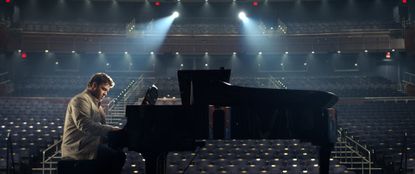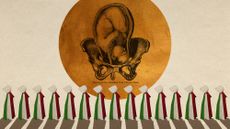Hollywood's big bet on Christian movies
In dark times, sometimes moviegoers just want a little light


Christian movies are on the rise.
Just this weekend, I Can Only Imagine — a religious indie film about the best-selling Christian music single of all time — stunned observers by raking in more than $17 million, good for third-place at the weekend box office.
This is hardly a random occurrence. In 2015, the Christian publication Movieguide charted that the number of films with "strong Christian content" had steadily risen from 16 in 1996 to 65 in 2015. Annual box office receipts from these films during this period skyrocketed from $200 million to more than $5 billion. And it's only getting bigger.
Subscribe to The Week
Escape your echo chamber. Get the facts behind the news, plus analysis from multiple perspectives.

Sign up for The Week's Free Newsletters
From our morning news briefing to a weekly Good News Newsletter, get the best of The Week delivered directly to your inbox.
From our morning news briefing to a weekly Good News Newsletter, get the best of The Week delivered directly to your inbox.
Throughout the '90s, Hollywood didn't think much about religious audiences. Few religious films were produced during this era, and the handful that made it to the big screen were made on miniscule budgets and featured mostly obscure actors. But something shifted in our cultural consciousness in the early 2000s. With terrorism fears spiking, many Americans became more consciously religious. Church attendance even spiked for a brief period.
As the frothy frivolity of the '90s receded, and the world got darker, many Americans found solace, meaning, or escape in faith and film.
Famously, Mel Gibson shocked the world with a blood-soaked film retelling the final hours of Jesus' life. In 2004, The Passion of the Christ earned more than $611 million worldwide on a $30 million budget and became the highest-grossing faith film in history.
Since then, America has experienced something of a faith-film renaissance. Many have been produced by major Hollywood studios and have featured A-list actors such as Ewan McGregor, Nicholas Cage, Jennifer Garner, and Joseph Fiennes. Though none of these films have been able to recreate The Passion of the Christ levels of financial success, many have performed very well.
In 2014, Darren Aronofsky's Noah starred Russell Crowe, Jennifer Connelly, and Emma Watson. It grossed more than $362 million at the box office. Ridley Scott's Exodus: Gods and Kings starring Christian Bale and Joel Edgerton pulled in more than $268 million. And TV pioneer Mark Burnett (Survivor and Shark Tank) produced Son of God, a film about Jesus' life. Burnett's wife, Roma Doney of Touched by an Angel fame, starred as Mary. The film grossed $67 million.
Last year, moviegoers flocked to see religiously themed movies such as Same Kind of Different as Me, starring Greg Kinnear and Renee Zellweger, and The Shack, which featured Sam Worthington and Octavia Spencer. The latter film grossed more than $96 million.
Given the relative success of films within this genre, it's not surprising that Hollywood shows no signs of letting up when it comes to religious flicks. Last month, Samson retold the tale of the biblical strong man. And now I Can Only Imagine, about one of the most popular Christian songs in modern times, is a bona fide hit. Dennis Quaid, who costars in the film, has a theory on why faith-based films are succeeding.
"When people — adults, kids, families, couples — go to the movies, it is a chance for them to escape from the everyday shenanigans of life," he told me. "People want to feel good when they leave the theater."
This weekend, Paul, Apostle of Christ will be released. The film is the first major cinematic retelling of the life of the first century disciple of Jesus who wrote nearly half of the New Testament. Actor Jim Caviezel, who famously played Jesus in Gibson's Passion, will star in the lead role.
Additionally, Caviezel has just announced that he will reprise his role as Jesus in the sequel to The Passion of the Christ, which will tell the story of Jesus descending into hell for three days between the crucifixion and the resurrection. Caviezel predicts it will be "the biggest film in history." He may not be far off.
In our bleak moment of alternative facts, fake news, and flat-out lies, many Christian moviegoers hunger for stories that feel authentic and true. In a time during which we are constantly assaulted by headlines telling of scandal and misdeed, they desire films that feel wholesome and uplifting. And in a moment rife with uncertainty, they want stories that feel familiar and time-tested.
To be sure, Hollywood, so long a bastion of secular liberalism, has no desire to evangelize theatergoers. But they know a good opportunity when they see one.
Create an account with the same email registered to your subscription to unlock access.
Sign up for Today's Best Articles in your inbox
A free daily email with the biggest news stories of the day – and the best features from TheWeek.com
Jonathan Merritt is author of the book Learning to Speak God from Scratch: Why Sacred Words are Vanishing — and How We Can Revive Them and a contributing writer for The Atlantic.
-
 Italian senate passes law allowing anti-abortion activists into clinics
Italian senate passes law allowing anti-abortion activists into clinicsUnder The Radar Giorgia Meloni scores a political 'victory' but will it make much difference in practice?
By Chas Newkey-Burden, The Week UK Published
-
 Magazine interactive crossword - May 3, 2024
Magazine interactive crossword - May 3, 2024Puzzles and Quizzes Issue - May 3, 2024
By The Week US Published
-
 Magazine solutions - May 3, 2024
Magazine solutions - May 3, 2024Puzzles and Quizzes Issue - May 3, 2024
By The Week US Published
-
 Walter Isaacson's 'Elon Musk' can 'scarcely contain its subject'
Walter Isaacson's 'Elon Musk' can 'scarcely contain its subject'The latest biography on the elusive tech mogul is causing a stir among critics
By Theara Coleman Published
-
 Welcome to the new TheWeek.com!
Welcome to the new TheWeek.com!The Explainer Please allow us to reintroduce ourselves
By Jeva Lange Published
-
 The Oscars finale was a heartless disaster
The Oscars finale was a heartless disasterThe Explainer A calculated attempt at emotional manipulation goes very wrong
By Jeva Lange Last updated
-
 Most awkward awards show ever?
Most awkward awards show ever?The Explainer The best, worst, and most shocking moments from a chaotic Golden Globes
By Brendan Morrow Published
-
 The possible silver lining to the Warner Bros. deal
The possible silver lining to the Warner Bros. dealThe Explainer Could what's terrible for theaters be good for creators?
By Jeva Lange Last updated
-
 Jeffrey Wright is the new 'narrator voice'
Jeffrey Wright is the new 'narrator voice'The Explainer Move over, Sam Elliott and Morgan Freeman
By Jeva Lange Published
-
 This week's literary events are the biggest award shows of 2020
This week's literary events are the biggest award shows of 2020feature So long, Oscar. Hello, Booker.
By Jeva Lange Published
-
 What She Dies Tomorrow can teach us about our unshakable obsession with mortality
What She Dies Tomorrow can teach us about our unshakable obsession with mortalityThe Explainer This film isn't about the pandemic. But it can help viewers confront their fears about death.
By Jeva Lange Published